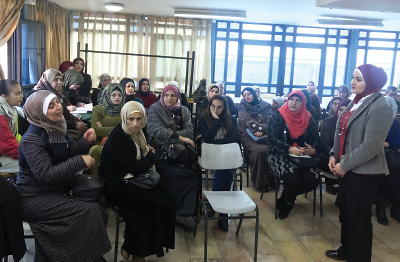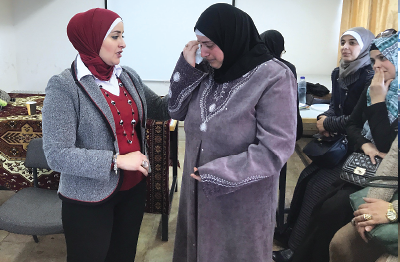The epiphany for Sherein Abdeen, M.A., B.S., came in her third year teaching chemistry and science to elementary and middle school youth in Jerusalem.
“There was something more important for me to do than teach chemistry,” Abdeen recalled in a recent interview in East Jerusalem. Her fellow educators seemed to have no good ways aside from punishment for dealing with students with serious behavioral problems. So Abdeen left teaching to seek solutions to those problems.
She began by attending lectures by Palestinian psychiatrist Samah Jabr, M.D., at East Jerusalem’s Al Quds University. She also developed a long-distance mentoring relationship with Elizabeth Berger, M.D., a clinical associate professor of psychiatry at George Washington University, where Jabr is a clinical associate professor and Abdeen is now a clinical instructor. (See “
Psychiatry Residency Builds Global Reach by Using Local, Overseas Settings”.) To gain practical experience, she worked in Jabr’s clinic from 2009 through 2014.
Next, Abdeen developed a three-pronged project to help out her former fellow teachers and their students with the assistance of the Palestinian Medical Education Initiative, run by Berger and Michael Morse, M.D., a former resident at George Washington and now at Medstar Georgetown University Hospital in Washington, D.C. Berger supervised the project by Skype—grounding the program in a medical model rather than the more common psychosocial programs that are often implemented in the West Bank.
Starting in one school, Abdeen trained teachers to recognize the problems and symptoms of mental illnesses. She did not stop there, however. She organized a committee at the school consisting of two teachers, the principal, a counselor, and herself. The committee met once a week, discussing two to five cases each session. The group talked over each case, and Abdeen offered suggestions about how the teachers could approach the students and their parents to improve the children’s behavior. Abdeen provided her professional expertise to the committee, but she did not directly treat students. Difficult cases were referred to outside mental health professionals.
At the weekly meetings, each child was given a score, and the committee members chose actions designed to move that score down to zero over a period of weeks or months.
In 2015, she expanded the program to three private schools in the Jerusalem neighborhood of Beit Hanina with the support of GIZ, the nonprofit German Society for International Cooperation. The program next expanded in 2016 to a school in Bethlehem with funding by an Italian aid group. Then last year, the World Health Organization backed expansion of the program to five more Jerusalem schools run by the Palestinian Ministry of Education, when 60 teachers and principals began training on childhood mental disorders and building skills to deal with children affected by them.
She insists that principals must always be members of committees, both to be trained and to see the advantages of mental health approaches over disciplinary ones, as well as to ensure that the school is committed to the program.
Abdeen would like to expand teachers’ training opportunities and add an incentive to participate by taking them out of the country to Europe or the United States to demonstrate other methods of behavioral control in the classroom. A trip to New York last year to deliver a paper at the American Academy of Child and Adolescent Psychiatry meeting offered her an insight into how families outside a conflict zone dealt positively with children and spouses.
Implementation has brought its challenges. For one thing, there are only so many schools that she can cover alone. Morse said he wants to “Xerox Sherein,” but a more realistic option is finding the funds to train other professionals. In addition, teachers and principals already face heavy time burdens and complain that the ministry puts too many other projects on their agendas. So next year, Abdeen will expand only to schools that aren’t so burdened. She finds that educators, too, have their blind spots, such as expressing skepticism about medications like stimulants or antidepressants. She asks them: “Is it better for the child to have problems or to improve by taking medication?”
Abdeen also works to help parents understand their children’s behavior and engage in their care.
“Stigma is a big issue,” she said. Educating parents who may know little about mental health takes up much of her energy. Some parents are only critical of their children and offer no positive communication, but she knows that solutions to children’s psychiatric problems often require involving the whole family, she said. So she works to get parents to come into the school, meet with the committee, and then work together.
Her goal is to get everyone—teachers, principals, mothers, fathers—to understand the children and not blame them or give them negative feedback for their actions.
“I tell them not to look at the bad behavior but to look for what’s behind the behavior,” she said. “Why does the child have the need to act out and disturb the class? I help them to look for the good inside their child.” ■


